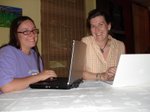
I had dinner last night in Pasadena with my bosom college friend of twenty+ years, Tiné (on the left). She has had my chapters for the last several days, and is my only other reader besides Letterlady. Tiné was wonderfully helpful and very candid. She said that as she was reading it, she realized that it was like someone handing her their newborn infant, looking down and realizing that the baby is cross-eyed. I thought that was a perfect way to discuss a draft and plan to use the same analogy with my students. My draft is on its way to becoming a book, but it's cross-eyed and needs some vision therapy.
Tiné was able to articulate what I suspected was the biggest issue, which is that right now it is entirely plot driven, and that there are big gaps that need filling in. Everything written up to this point serves to advance the plot, and what's missing is a lot of the information that will help create a fully realized world around our two heroines. She described the heroines as existing right now in a vacuum, and wanting more information about everything and everyone around them so that the reader can inhabit their world, not just their points of view. She suggested that I continue to write the plot, and then when the whole draft is articulated from beginning to end, go back and add all the stuff that will answer the questions and fill out the world.
As a result of needing more of the characters' inner monologues and backgrounds, Tiné said it was hard to know who to sympathize with, especially since they all make morally questionable choices. I think the solution to that is having more access to their thought processes as they are making their choices, so that we are in on their own self-reflection and therefore understand why they are doing things. That way even if they make choices we wouldn't make ourselves, we can at least know why they made them, and sympathize with their dilemmas if not their decisions.
Other hugely helpful observations she made:
The names I've chosen for my characters are often hard to pronounce and trip the reader up. I need to revisit all of them and think about that aspect of it. I love names, and I love unusual names, so this could be painful.
I need to really figure out who my audience is, and how overt all the Greek stuff wants to be. Is it a titillating beach read for readers who may never have heard of Ovid and won't notice the allusions? Is it for more erudite, literary types who will get every allusion and criticize me when I stray from the original? How does the answer to the question affect the way it's written?
I think in a lot of ways, my background with dramatic literature (two degrees in theater) is in part responsible for the problems Tiné pointed out. So far, I have written a lot of dialogue and plot, both of which are central in a dramatic script that's intended to be performed. But in a script, dialogue and plot are only the sheet music for the actors to interpret. (In a play, names can be difficult because the actors will say them for the audience and the audience doesn't have to figure them out for themselves. Just think about Shakespeare and Shaw's names. There is a good reason that theater companies employ dramaturgs and speech coaches.) A novel needs to be fully formed and leave far less to the interpretation of the audience, as the novelist is both playwright and actor. A play needs to be relatively short. A novel is far less limited. I need to give myself permission to leave the momentum of the action and explore the more literary elements of fiction. I need to let in more poetry and figurative language, more flavor, more color. I need to allow more meandering into the lives of the other characters who interact with the heroines, so that when they do interact, it's from a three-dimensional place and not a vacuum.
SO, the challenge I feel right now is to create a paradigm in which I can continue to write this book while working full-time and being a single mom. Since this next fall will be my first ever in that capacity, a lot will be trial and error, I think. Surely there is a way to be productive without being isolated for days at a time in a tiny house in the mountains? In that regard, writing poetry is easier. An hour stolen here or there can result in a poem. An hour of novel writing is like ten minutes of physical exercise: barely enough to get warmed up enough to make it safe to proceed...

1 comment:
How painful, to need to perhaps change the very personae of your characters with the changing of their names! It would very likely make your less erudite (read: "me" :) ) readers more comfortable, though be slightly maddening to those who delight in literary references.
Post a Comment